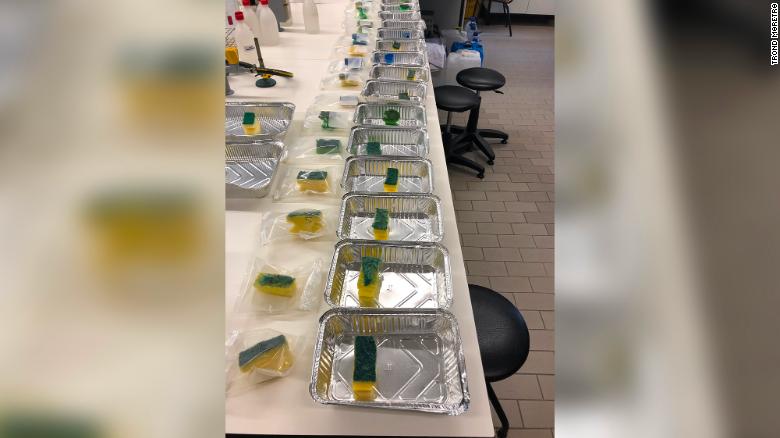Sponges host various types of bacteria, study finds 0:49
(CNN) --
Kitchen sponges harbor more bacteria than kitchen brushes, which could be a more hygienic way to clean dishes, according to researchers in Norway.
"Salmonella and other bacteria grow and survive better on sponges than on brushes, the reason being that everyday sponges never dry out," said Trond Møretrø, a research scientist at Nofima, a Norwegian food research institute.
"A single sponge can host a larger number of bacteria than people on Earth," says Møretrø, author of a new study, published online in the Journal of Applied Microbiology.
A kitchen sponge is the perfect environment to harbor several types of bacteria, according to a study
While many bacteria aren't harmful, those that are, like salmonella, can spread from sponges to hands, kitchen surfaces and equipment, potentially making people sick, he said.
"The sponge is wet and collects food residue that is also food for bacteria, causing rapid growth of bacteria."
What surprised the researchers most about their findings was that it didn't really matter how people cleaned their sponge or how often.
advertising
"How consumers used their sponges didn't matter much in terms of bacteria growth. It's very difficult for consumers to prevent bacteria from growing on sponges as long as they don't change them daily," Møretrø said.
The research on used sponges and brushes builds on a laboratory study published last year by the same team of researchers, which found that harmful bacteria survived better on sponges than brushes.
The sponges collected in the study were tested for different types of bacteria.
In the United States, the Department of Agriculture has stated that microwaving or boiling kitchen sponges can reduce "some of the bacterial load," though these measures alone are not enough to ensure your sponge reduces contamination crusade.
It is advisable to buy new ones frequently.
The research is part of a project on food safety supported by the European Union.
sponge vs.
brush
The researchers collected kitchen sponges from 20 people living in Portugal and 35 brushes and 14 sponges from people living in Norway.
An earlier survey of 9,966 people by the research team found that sponges were commonly used for kitchen cleaning in most of the 10 European countries, while brushes were the dominant cleaning utensil in only two countries: Norway and Denmark.
All sponges were used for washing dishes and scrubbing pots and pans, and 19 of the 20 sponges in Portugal were used five to six times a week or more.
Of the brushes collected in Norway, 32 of the 35 were used five to six times a week or more.
Sponges collected in Norway were used less frequently.
What is salmonella and how to prevent it?
Pathogenic (disease-causing) bacteria were not found on the brushes or sponges.
However, overall bacteria levels were lower on the used brushes than on the sponges.
Similar types of non-pathogenic bacteria were found on the two cleaning utensils.
When the researchers added salmonella bacteria to brushes and sponges, they found a significant reduction in salmonella numbers on brushes left to dry overnight.
But there was no reduction in brushes stored in a plastic bag or sponges, regardless of storage conditions.
Owners of sponges and brushes commented on how long they used their sponge or brush and how they kept their cleaning utensils clean: by rinsing them with water, washing them with soap and water, putting them in the dishwasher or disinfecting them with bleach.
However, none of these things made a tangible difference, which surprised the researchers.
The main conclusion of the study was that the brushes, which are dried between each use, have a lower number of bacteria.
"Because the brush dries very quickly, harmful bacteria are killed. Also, most brushes have a handle that prevents direct hand contact with potentially harmful bacteria, unlike sponges," he said.
"I encourage consumers to try a brush instead the next time they need to replace their sponge."
How and how often to wash your towels, according to the experts
To do
While the study authors recommend the bristles of a brush over a sponge, Cath Rees, a professor of microbiology at the University of Nottingham who was not involved in the research, said she would still use a sponge to wash dishes.
For her, the most important thing is that it is a good idea to dry the sponges and cloths between each use.
"The main conclusion is that they found no evidence of pathogenic bacteria on sponges or brushes taken from a range of household settings, and therefore no evidence that these items are a significant source of contamination in normal household settings," Rees said.
"If there were some low levels of pathogens left on the cloth, they would grow very slowly (they grow optimally at body temperature), so you wouldn't expect to see a lot of pathogen growth, and this was consistent with their results: in humid conditions there was limited growth, in dry conditions the numbers remained the same or decreased," he explained.
Markus Egert, a microbiologist at the University of Furtwangen, Germany, who has done similar research, said he already uses dish brushes and cleans them in the dishwasher.
If people prefer a sponge, Egert, who was not involved in this study, recommended using a new one every two to three weeks.
"Brushes are the best option for cleaning dishes, from a hygienic point of view. This could have been anticipated before, but the authors prove it with some good experiments. However, in my experience, people love using sponges" .
bacteria sponges

